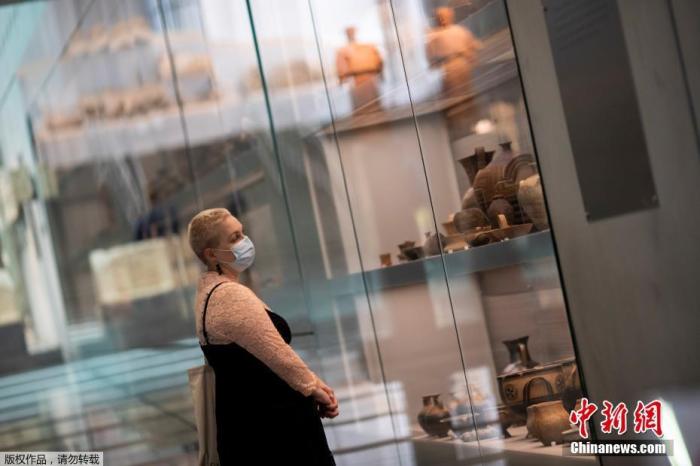China News Service, January 1st. According to the Greek “China-Greece Times” report, on the evening of December 31, 2021 local time, the Greek National Public Health Organization announced that in the past 24 hours, there had been 40,560 new confirmed cases of new crown in Greece, refreshing the country’s self-reliance. The highest daily increase since the outbreak.
Currently, the country has a total of 1,210,853 confirmed cases.
There were 76 new deaths that day, and the cumulative number of deaths reached 20,790.
Data map: On May 14, 2021 local time, Athens, Greece, the Acropolis Museum reopened to the public.
The picture shows tourists visiting the exhibits.
The Greek government strictly prohibits parties or gatherings
Affected by the new crown epidemic, Greece’s New Year’s Eve in 2022 will be different from the past: restaurants and entertainment venues are allowed to operate until 2 am, but music cannot be played.
Customers can only receive services at their seats, and each table can accommodate up to 6 customers.
In addition, according to Greece’s latest anti-epidemic policy, from December 30, 2021, hygiene stores will be open until midnight without music.
If people violate the epidemic prevention regulations, especially for holding group gatherings, they will face fines.
If gathering activities are held on the ship, the shipowner, management, crew and passengers will also be punished with huge fines.
Will Greek schools open as scheduled?
As the epidemic becomes more serious, many health experts have suggested that the school start date should be postponed.
However, the Greek Deputy Minister of Education Macri stressed in an interview that the government's goal is still to make schools open as scheduled on January 10, 2022.
She said that there are still about ten days to evaluate the data, and the authorities are waiting for the opinions of experts.
In this regard, Microbiology Professor Vatopoulos said that the Greek Committee of Health Experts will discuss and conclude in the near future that the closure or opening of schools depends on the rate of increase in cases, but due to the highly contagious Omi Keron mutant strain. Existence makes things more difficult to deal with.
Sariyanis, professor of environmental engineering at Aristotle University of Thessaloniki, suggested that the school’s start date could be postponed by one week, and the end date of the semester could also be postponed by one week, so as to ensure teachers in the epidemic. The health and safety of students will not fall behind the teaching schedule.
The definition of close contacts and the update of the quarantine policy
The National Public Health Organization of Greece has recently updated the definition of close contacts of confirmed cases.
details as follows:
- Face-to-face contact with a person diagnosed with COVID-19 within 24 hours, a distance of less than 2 meters and a contact time of more than 15 minutes;
--Persons who have had direct physical contact with the confirmed patient;
--Persons who have been exposed to the secretions of a confirmed patient without protective measures;
- People who stay indoors (such as home, classroom, conference room, hospital waiting area, etc.) with the confirmed patient for more than 15 minutes;
- Passengers in the same row and two rows before and after the case, passengers caring for the case or traveling with the case, crew members who have served the area near the case In the case of contact with more passengers, passengers sitting in the same area or even all passengers on the flight may be regarded as close contacts);
--Health care professionals or other personnel who provide care for a confirmed patient, or laboratory staff who handle clinical specimens of patients, are considered close contacts without taking protective measures.
The organization also updated the isolation policy for close contacts, including:
--For those who have been vaccinated with booster vaccines, they need to wear high-protection masks or double-layer masks for 10 days, and perform nucleic acid or rapid antigen testing on the 5th day after contact with the case;
--For those who have not been vaccinated or vaccinated, they need to stay at home for 5 days to avoid contact with others, and perform nucleic acid or rapid antigen testing on the 5th day. After 5 days, they need to wear a high-protection mask for at least 5 days. Or double-layer masks.

